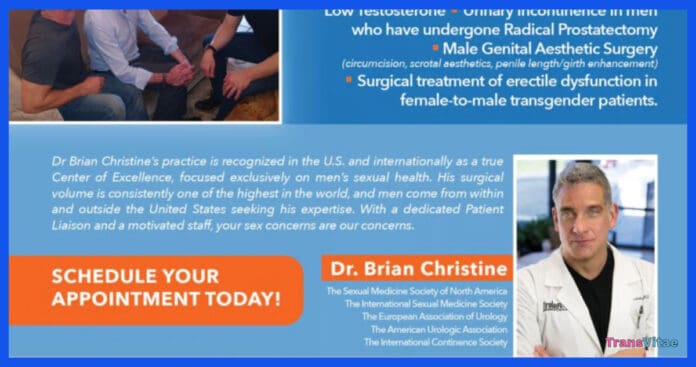President Donald Trump’s nomination of Dr. Brian Christine for Assistant Secretary of Health has sparked deep concern and confusion among transgender advocates and medical professionals—particularly in light of the urologist’s previous public association with trans-inclusive care, which he now denies.
Christine, a 61-year-old urologist based in Alabama, was officially nominated this week to succeed Adm. Rachel Levine, who made history during the Biden administration as the first openly transgender federal official confirmed by the Senate. If confirmed, Christine would oversee thousands of public health service officers and help shape national health policy, including responses to future health crises and public wellness initiatives.
But Christine’s record—and his recent comments—are raising eyebrows.
In a brief interview on Thursday, Christine stated, “Never treated those individuals. Never did that,” when asked about transgender patients. However, this directly contradicts past advertisements and public documents tied to his own medical practice. A 2017 full-page ad in Peach ATL, a regional LGBTQ magazine, prominently featured his photo and name, offering services for “gay, cis, trans” men and promoting “male genital aesthetic surgery.” The ad explicitly said, “No prejudice or bias, just outstanding care.”
Furthermore, archived versions of Christine’s personal website described his practice as addressing “erectile dysfunction in patients who have undergone female-to-male gender reassignment,” a point also noted in a 2019 medical conference biography.
This contradiction comes at a time when Trump’s administration is pursuing aggressive rollbacks of LGBTQ+ rights. On his first day back in office, Trump ordered federal agencies to eliminate references to “gender ideology,” reinstated restrictions on military service for most transgender people, and directed the Department of Health and Human Services to limit access to gender-affirming care for minors.
While Christine is recognized in the urology field for his expertise in penile implants and sexual health, he has no experience in government. He previously ran for the Alabama State Senate in 2022 and has donated thousands of dollars to Republican campaigns, including over $8,000 to Trump’s 2024 presidential run.
Christine has also made inflammatory statements about transgender people. On social media, he posted that “surgery or hormones do NOT change” someone’s gender and has spoken out against transgender athletes. In previous interviews and opinion pieces, he likened gender dysphoria to addiction and advocated for “corrective care” like intensive counseling or “pastoral care” for trans youth—views starkly opposed to the affirming model supported by every major U.S. medical association.
This reversal—where Christine now distances himself from prior trans-inclusive marketing and denies treating transgender patients—feels not only contradictory but harmful to many in the trans community. Advocates say it reflects a broader political strategy: appealing to conservative voters by disavowing even indirect ties to transgender health care.
Transgender Americans and their allies have voiced concerns that if confirmed, Christine could further dismantle access to gender-affirming care and institutionalize a health agenda driven more by politics than by science or compassion.
The Senate Health, Education, Labor, and Pensions Committee has yet to schedule a confirmation hearing.
In the meantime, many in the LGBTQ+ community are left wondering: if even a doctor whose past ads promised “no prejudice or bias” is now walking that back, what hope is there for honest, affirming leadership in public health?
As one trans advocate told TransVitae, “We deserve leaders who see us, who listen to science, and who aren’t ashamed of having treated us with dignity.”


